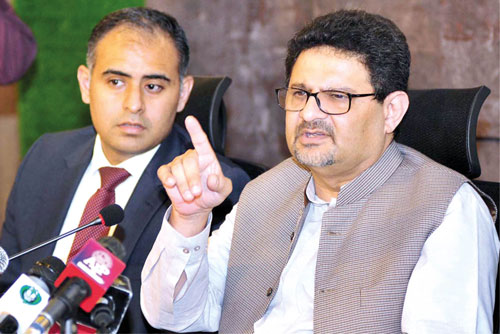Imported phones, vehicles, home appliances to become expensive
Ijaz Kakakhel Islamabad
The federal government on Thursday announced lifting ban on import of non-essential and luxury items, three months after the restriction was imposed.
Addressing a press conference, Finance Minister Miftah Ismail announced that the federal government was lifting the ban, noting that the restrictions were imposed in line with the International Monetary Fund’s demands. The finance minister said that the government’s top priority was to provide basic necessities to the population as the country had a limited amount of dollars.
Miftah said that after much back-and-forth, the IMF has finally announced that its board meeting will take place on August 29, for considering Pakistan’s request for the release of the $1.17 billion tranche. The finance minister noted that the government has also fulfilled all the pre-requisites of the lender, while the funding gap of $4 billion has also been met after friendly countries agreed to help Pakistan financially. Miftah said that after the import ban, it became easier for the government to import necessary commodities, which were essential for the masses.
“We had to choose between importing cars and wheat. Therefore the government had imposed a ban on the import of non-essential items,” the minister added. He further said that the government was scrapping the import ban as it was a requirement of the international community. However, Miftah said, the government would be imposing heavy regulatory duties on these items, adding that as a result these items would not be imported as finished goods. The minister pointed out that the heavy duties will be imposed on completely built-up commodities — cars, mobile phones, and electronic appliances — and apart from them, the imported fish, meat, purse, and other such non-luxury items. “Even then, if a person wants to import a car that is originally worth Rs60 million [but after the regulatory duties] it will cost them Rs300-400 million, they can import it.”
Miftah said the government’s purpose was not just to allow imports of such items but to comply with the IMF conditions and other international agreements while also keeping the current account deficit in check.
The government had aimed to collect Rs42 billion through retail taxes but it would not be able to meet that target, Ismail conceded. “Our revised target is Rs27bn and we will be able to achieve this.” He said the government would pass an ordinance to remove the fixed tax on small traders. However, the variable taxes — 5pc sales tax and 7.5pc income tax — would remain on every trader for the next three months, he said.
After the three months, the variable taxes would remain the same for traders using between one to 50 units of electricity while they would be increased for those whose units were above 50, he added.
“To meet the gap, we are imposing a further tax of Rs36bn on the tobacco industry. The current tax of Rs1,850 per 1,000 cigarettes on tier 2 packs will be increased to Rs2,050 and Rs5,900 per 1,000 cigarettes on tier-1 packs will be raised to Rs6,500. The Rs10 per kg cess tax on tobacco is being increased to Rs380 per kg.”
The minister said the Federal Board of Revenue used to impose taxes on subsidized electricity as well in the past, which had now been removed while sales tax on it would be removed through the upcoming ordinance.
“For example, we used to provide electricity to a small consumer for Rs9 per unit while Ogra (Oil & Gas Regulatory Authority) would fix the price at Rs22. So, the FBR would demand sales tax at the price of Rs22 per unit, but we said the tax will not be imposed on the subsidized amount,” he explained, adding that the government would introduce similar measures for gas.
He said that he would address the sales tax imposed on agricultural machinery as well. “It is a very minor thing and will have little fiscal impact.” He said the country’s exports this year so far were 7-8pc more compared to last year while imports were 18-19pc lower and the trade deficit was around 30pc lower. The money received in the banking system was $600 million higher than last year, he added.










